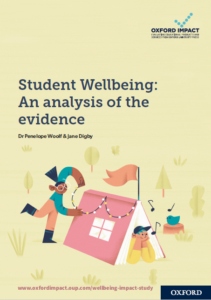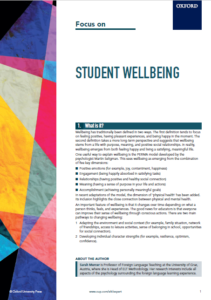In recent years, policymakers and practitioners have increasingly focused their attention on the importance of student wellbeing. It goes without saying that recent events have emphasized this as students try to cope with an unprecedented amount of change in the ways in which they live and learn. However, the evidence on how schools and teachers can promote student wellbeing, and the effects of wellbeing on other educational outcomes, is a relatively new topic for researchers.
We all know that wellbeing is important. It can help students learn how:
- to build more positive relationships
- to gain skills for managing their emotions and behaviour
- to maintain a healthy body and mind
- to develop and improve concentration, motivation and energy levels, which are all beneficial not only for personal wellbeing, but also to their studies.

Understanding the links between wellbeing and academic attainment
Dr Penelope Woolf, Director of Impact, and Jane Digby, Oxford Impact Marketing and Communications Manager at OUP presented a webinar showcasing some research undertaken in the form of an Evidence analysis impact study* that OUP commissioned to inform the new Oxford International Curriculum.
The impact study conducted by Dr Ariel Lindorff, Departmental Lecturer in Research Methods, Department of Education, University of Oxford, included research from many different countries, to better understand any potential links between wellbeing and academic attainment, as well as other educational outcomes. The research had a particular focus on whole-school approaches to promoting wellbeing and explores the factors that contribute towards an effective strategy for implementation.
Key findings
The Evidence analysis impact study found that there is evidence of a link between wellbeing and attainment and between whole-school approaches to wellbeing and attainment, but that it did depend greatly on implementation.
There is also evidence that these relationships hold true across different contexts and countries, although there is some variation and more research is needed over a longer period of time.
Findings from the impact study demonstrate that in order to ensure successful implementation of wellbeing strategies across the school, it is worth considering:
- tailoring them to specific school contexts
- taking an integrated, cross-level approach
- actively engaging the wider community
- focusing on professional development
- putting monitoring systems in place
- ensuring that sufficient time and resources are available.
And, importantly, it is far more likely to work if supported by senior leaders.
Find out more
If you would like to find out more information about the impact study, then we have a dedicated page on our Oxford Impact website at oxfordimpact.oup.com/wellbeing-impact-study
This page includes:
- the impact study report
- an infographic showing the key findings
- a video of Dr Ariel Lindorff talking about the impact study and research findings.
If you would like to find out more information on how OUP is evaluating the impact of its products and services, visit www.oup.com/oxfordimpact.
Handout from the webinar
A detailed handout is available sharing all of the information given at the conference.
Download handoutAny recommendations in this handout are based on evidence and are not advice from OUP. They should be assessed against the context you work in before decisions are made on implementation.
Additional Reading – ELT student wellbeing focus paper
Teaching for student wellbeing has been recognised as one way to prepare students to lead fulfilled lives. This paper explains the importance of wellbeing and provides practical ideas and activities to help teachers promote student wellbeing in the ELT classroom. The paper can found at the link below:
ELT Focus Papers
* An impact study assesses the change a product or service has on the people or group of people it is intended to help or benefit (learners, teachers, senior leaders, and parents/carers).




